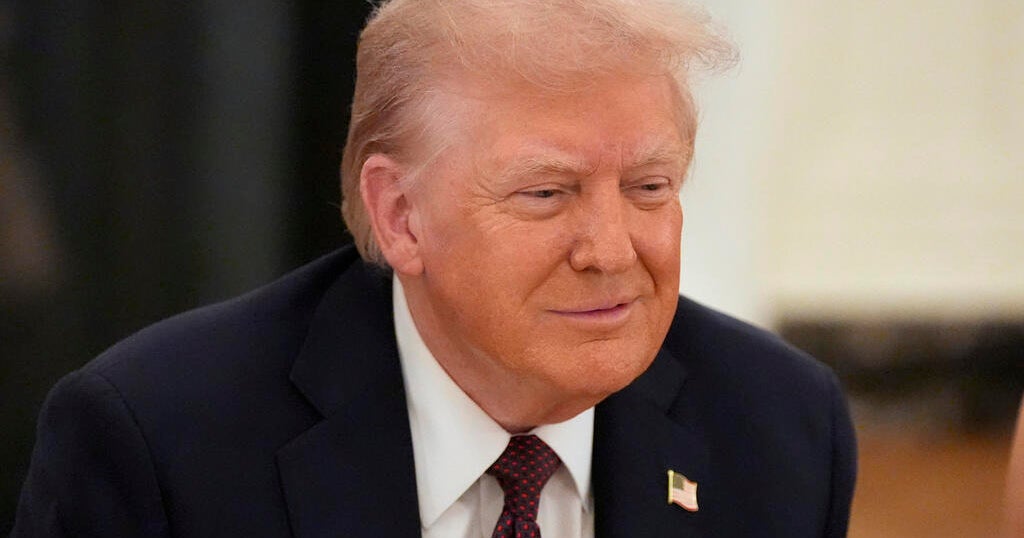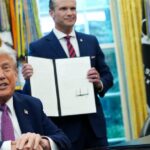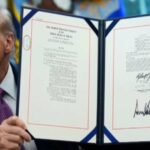In a significant move to combat the wrongful detention of American citizens abroad, President Donald Trump signed a new executive order on Friday that introduces a pathway for imposing sanctions on nations guilty of illegally holding U.S. nationals. This initiative manifests concern for the hundreds of Americans who find themselves unlawfully detained or taken as hostages around the globe, robustly enhancing the U.S. government’s interventions and responses to such incidents.
Before its official signing, CBS News provided an early report on the order, which has drawn comparisons to existing measures against state sponsors of terrorism. The executive action endeavors to position the wrongful detention of Americans in a similar diplomatic and legal framework as egregious acts like terrorism, aiming to implement a rigid system of accountability for nations leveraging U.S. citizens for political gains.
Under this new designation, the U.S. State Department would be endowed with substantial legal instruments—ranging from sanctions and export controls to travel bans—against countries recognized as state sponsors of wrongful detention. These measures are tailored not just to punish but also to deter and diminish the odds of American citizens traveling to high-risk nations. Furthermore, they are designed to pressure such nations to release any illegally detained U.S. nationals promptly.
A senior administration official emphasized the power and scope of this initiative, stating, “Now, we have the incredible tools at our disposal that we use against state sponsors of terrorism available for addressing nations that engage in the wrongful detention of our citizens. Such actions by these nations do not need to connect with funding terrorist organizations like Hamas, Hezbollah, or Al-Qaeda. Mere attempts to exploit American nationals wrongfully will see these countries face strict actions.”
The urgency of this issue is highlighted by statistics from organizations like the Foley Foundation, which advocates for wrongfully detained individuals. According to their data, by 2024, at least 54 Americans were reported to be held hostage or wrongfully detained across 17 different countries. This indicates a pressing need for a more structured and robust response from the U.S. government towards such violations of international law and human rights.
The State Department presently utilizes a tiered advisory system to guide Americans planning overseas travel, classifying countries by various levels of safety risk, with “Level 4: Do Not Travel,” being the most severe. Currently, 21 countries fall under this category, including Iran, Afghanistan, Russia, Venezuela, and North Korea – many of which are notorious for their risk of wrongful detentions.
This initiative isn’t unprecedented in legislative terms. During President Trump’s first term, Congress passed the Robert Levinson Act, named after a former FBI and DEA agent who went missing in Iran in 2007. The act makes provisions for the State Department to classify a detained U.S. national as “wrongfully detained” under several criteria, such as the fairness of the judicial process of the country in question, evidence suggesting the individual’s innocence, or indications of their detainment being used as leverage against the U.S.
The tragic narrative of Robert Levinson underscores the depth of anguish and loss associated with such detentions. Levinson was presumed dead by U.S authorities in 2020, believing he died while under the custody of the Iranian government. His daughter, Sarah Levinson, rallied behind the new executive order, thanking President Trump and his officials for setting a decisive tone against the practice of taking hostages.
President Trump’s executive order comes in the wake of several high-profile cases, where American citizens were detained under dubious circumstances and later released as part of complex diplomatic exchanges. This includes individuals like Evan Gershkovich, a journalist, and Paul Whelan, a Marine veteran, who were both held in Russia on debatable espionage charges and freed in a notable 2024 prisoner exchange which also saw involvement from the German government.
Paul Whelan praised the new order but urged its strict enforcement against countries like China and Russia, typically known for leveraging such detainments. He also advocated for compensations for those wrongfully detained, using assets frozen from those “rogue regimes.”
Other notable releases, such as that of WNBA star Brittney Griner from Russian detention in exchange for a notorious arms dealer, and American teacher Marc Fogel for a Russian crypto fraudster, highlight the continuous trading tensions involving wrongfully detained Americans.
This move by President Trump has thus ignited a robust policy stance against a growing international crises, illustrating the U.S. government’s resolve to protect its citizens globally by equating wrongful detentions with other severe global offenses such as terrorism. The awaited application of these powerful new tools could significantly deter the wrongful detention of Americans, ensuring they are accorded protection and justice on an international scale.









